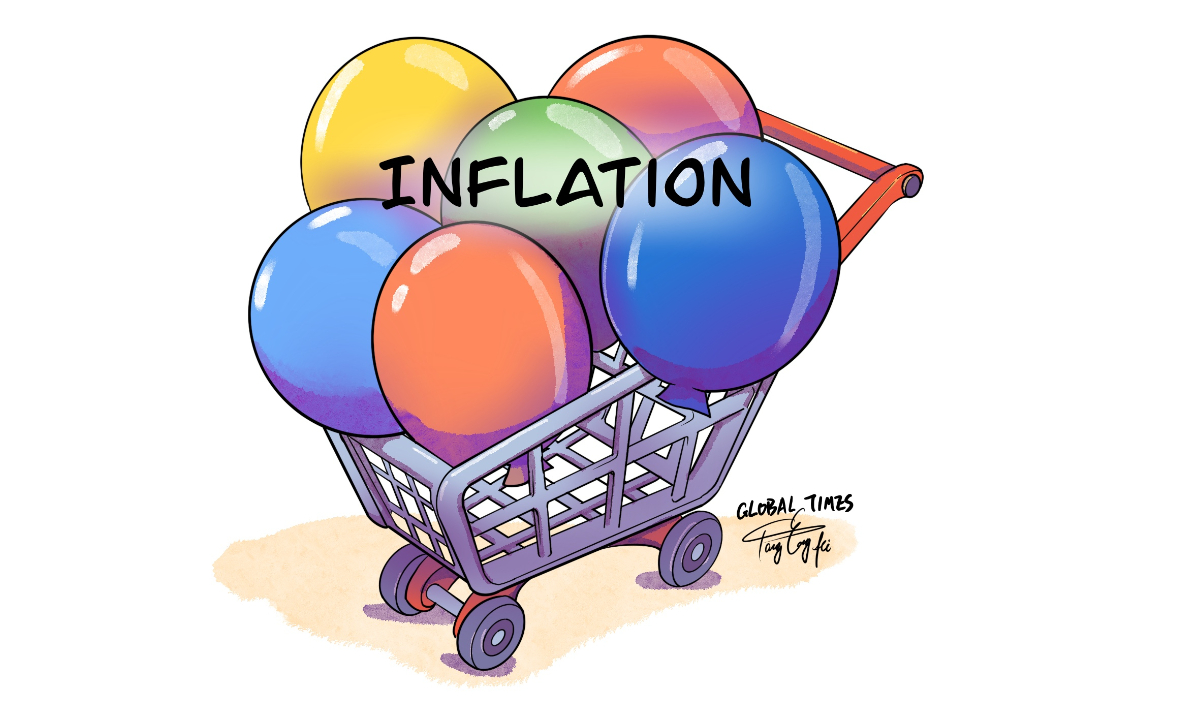
Illustration: Tang Tengfei/Global Times
Days after flocking to stores on Black Friday, American consumers are turning online for Cyber Monday to score more discounts on gifts and other items that have ballooned in price due to high inflation, the Associated Press (AP) reported on Monday.Although some statistics showed customer spending on Cyber Monday might have hit a new record high this year, those numbers are not adjusted for inflation, and when inflation is factored in, analysts said the amount of items consumers purchase could remain unchanged - or even fall - compared to prior years, according to media reports.
To an extent, what's happening on Cyber Monday is just a microcosm of the challenges facing the US economy as inflation reaches a 40-year high. Stubbornly high inflation is dampening demand.
"We're seeing that inflation is starting to really hit the wallet and that consumers are starting to amass more debt at this point," Guru Hariharan, founder and CEO of retail e-commerce management firm CommerceIQ, was quoted by the AP as saying.
American consumers' sentiment hit a four-month low in November amid worries about the rising cost of living. US Index of Consumer Sentiment is at a current level of 56.8 this month, down from 59.9 in October and down from 67.4 one year ago, according to the US Index of Consumer Sentiment (ICS) provided by the University of Michigan.
Dragged down by uncertainty and concerns over future inflation expectations and the labor market, it may take some time for US consumer confidence to recover. Moreover, the volatility in US financial markets has hit high-income consumers, who may spend less in the future.
Looking ahead to next year, the outlook for declining home prices and a potentially weaker equity market may lead the average household to soften spending in the process, according to a report released by Bank of America (BofA) on Monday.
Stubbornly high inflation and the weakness in consumer spending are partly a result of the US Federal Reserve's extra loose monetary policy in the post-pandemic period, along with the government's coronavirus relief packages that have injected too much liquidity into the economy. The US federal budget deficit soared to a record $3.1 trillion in the 2020 fiscal year, according to media reports, as the COVID-19 pandemic fueled enormous government spending.
Without the expansion of production, there is an excess of liquidity in the US financial system, which partly explains why in recent months inflation hit its highest level in 40 years. Surging inflation is eroding living standards of US consumers, leading many low- and middle-income households to change spending habits. There are some warning signs as the US' spending on goods, led by food and beverages, gasoline and motor vehicles, declined for the third consecutive quarter, according to a report on World Economic Forum site last week. The Chinese version of Voice of America said in a report on Tuesday that more shoppers go back into stores with a desire to browse but less of a clear intent to make a purchase.
Today, the spending habit of US households is related to the prosperity of the US economy, as well as the US position on global trade. Consumer spending is the single most important driving force of the US economy. However, now high inflation is eroding household budgets, increasing the chances of an economic recession.
The US is the world's largest economy and the world's largest consumer market. Exporters from the developing countries and around the world can share the dividends brought about by US' consumer market, which constitutes the foundation of the US' dominant economic influence in the global economy.
However, now things seem to be changing. There is a possibility that the weakness in consumer spending will persist, with long-lasting consequences that undermine US' economic influence.
The author is a reporter with the Global Times. bizopinion@globaltimes.com.cn
